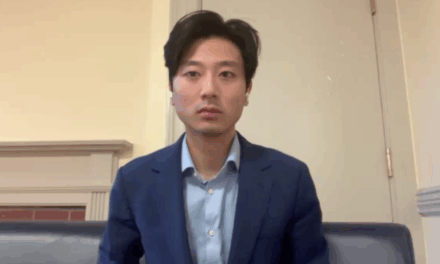In a striking encounter that garnered significant attention, a mother from California confronted a local lawmaker recently during a public event, addressing the contentious issue surrounding transgender athletes in sports. Her passionate plea highlighted the deeply emotional and complex nature of the debate, which transcends traditional political boundaries.
The mother, who identifies as a Democrat, challenged the legislative position regarding the participation of transgender athletes in girls’ and women’s sports. She emphasized the need for an open dialogue about the implications of such policies, framing her concerns as not representative of a political divide, but rather rooted in the welfare of all children involved.
This face-to-face interaction unfolded at a town hall meeting where lawmakers were discussing various issues that affect the community, including health care and education challenges. The meeting seemed routine at first, but it quickly escalated when the mother addressed the assembly, raising her voice to emphasize her point about fairness in competitive sports.
“This is not about politics,” she asserted firmly, as the audience turned its attention to her. “This is about protecting our daughters’ opportunities. As a mother, I want fairness in sports for everyone. We all want our kids to succeed, regardless of how they identify.”
The mother explained her perspective, emphasizing the importance of sports as a venue for developing skills, teamwork, and self-esteem. She argued that allowing transgender girls to compete against cisgender girls could potentially alter competitive dynamics and affect the opportunities available to female athletes.
Her concerns align with a broader national debate that has seen various states take divergent paths when it comes to the inclusion of transgender athletes in school sports. Some lawmakers have moved to enact bills that restrict participation based on biological sex at birth, citing fairness and safety as key reasons for their stance. Conversely, opponents of such legislation argue for the necessity of inclusivity, contending that all individuals should have the right to participate in activities that align with their gender identity.
As the mother continued to articulate her concerns, the lawmaker in question, who has championed inclusivity for transgender individuals in sports, appeared taken aback but offered a response rooted in a commitment to equality and representation. He acknowledged the complexities of the issue, stating, “I understand your concerns and your passion as a parent. However, we must also consider the rights and feelings of transgender individuals. This is a nuanced conversation.”
This response did not quell the mother’s frustrations. She pressed further, reiterating that the safety and fairness for young female athletes is paramount. “My goal is not to exclude anyone, but I want everyone to have an equal and fair chance. We’re not talking about politics; we’re talking about our kids,” she remarked, bringing the audience into her viewpoint on a deeply personal matter.
The interaction sparked varied responses from the attendees. Some expressed support for the mother’s views, voicing their own concerns regarding competitive fairness in girls’ sports, while others aligned more closely with the lawmaker’s stance on inclusivity. This divergence of opinions reflects the ongoing national discourse around the rights of transgender individuals and the complexities involved in legislating based on gender identity.
National surveys indicate that Americans are divided on issues regarding transgender athletes’ rights. Many support their participation but also express concerns about fairness in competition. This nuanced perspective complicates legislators’ roles, as they navigate constituent opinions while trying to create inclusive environments for all individuals regardless of gender identity.
As the meeting progressed, the mother’s confrontation became a jumping-off point for a larger conversation within the community. Questions about inclusion in sports, the rights of transgender individuals, and the importance of maintaining fairness in competition emerged as focal points. Educators, parents, and community members began to engage in discussion, sharing personal stories and viewpoints that underscored the myriad feelings surrounding the topic.
The mother was widely praised on social media platforms afterward for her willingness to confront the lawmaker directly, a move many viewed as courageous. Supporters emphasized that her concerns represent many parents’ feelings as they struggle to understand the implications of current policies affecting youth sports.
Meanwhile, LGBTQ+ advocates expressed disappointment over the conflict, cautioning against painting opponents as adversaries based purely on differing viewpoints. They emphasized the emotional nature of the topic and the necessity for dialogue rather than division, reminding the public that children’s experiences should be approached with empathy on all sides.
In light of this event, there are calls for more inclusive community forums where these discussions can be held without fear of conflict. Several local organizations have expressed interest in facilitating open dialogues aimed at fostering understanding and collaboration, rather than division. The hope is that these conversations can lead to solutions that respect the rights of all individuals while addressing the concerns parents have about their children’s competitive opportunities.
As this debate continues to unfold across the nation, the theme of fairness in sports remains at the forefront. Participants advocate for the essence of competition while also recognizing the fundamental right of all individuals to participate and compete as their authentic selves.
Moving forward, it is clear that this issue will not be resolved easily. The complexities of gender identity, competition, and how best to balance fairness with inclusivity are questions lawmakers will grapple with, as they seek to understand the best path forward for all constituents.
The encounter serves as a reminder that conversations around such topics can evoke strong emotions and opinions. It showcases the challenges of navigating personal beliefs in the public sphere, especially when the stakes are perceived as high for the well-being of future generations.
As the discussions evolve, it will be crucial for all parties involved—parents, athletes, lawmakers, and advocates— to engage in respectful, constructive discourse aimed at bridging divides while seeking common ground to support the diverse needs of youth in sports.
The mother’s confrontation with the California lawmaker was not just a moment of conflict; it was a reflection of the times and the multifaceted nature of societal change. As more voices join the fray, the hope is for a future where all children feel safe, supported, and empowered to compete and succeed in their endeavors, irrespective of gender identity.































